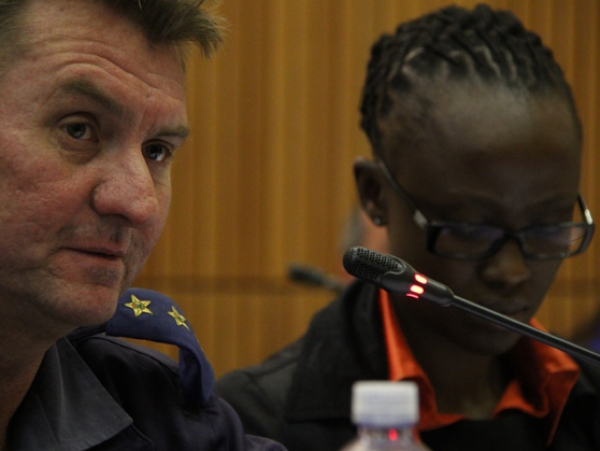Police hammered on Lwandle eviction violence

At the Lwandle Commission of Inquiry today, the police were hammered for failing to engage community leaders in an attempt to prevent the escalation of violence during evictions at Lwandle informal settlement in June. Such a failure falls foul of the legal requirements for public order policing.
Police officers Lieutenant Colonel Jimmy Lucas and Captain Daniel Potgieter appeared before the inquiry today. They were questioned on the role of Public Order Police (POP), in which they hold commanding positions, during the controversial evictions of hundreds of shackdwellers from land owned by SA National Roads Agency Ltd (SANRAL) on 2 and 3 June. The evictions prompted violent clashes between POP members and protesting residents on both days.
Commissioner Nomhle Dambuza asked Captain Potgieter whether he thought enough had been done by POP to ensure that “the use of force” was avoided and that the “highest degree of tolerance” was displayed to the crowd. Dambuza referenced the police’s National Instruction (NI) for crowd management – a legal document prescribing how POP operations must be planned and performed.
The NI emphasises that the POP operational commander must attempt to “build trust” with the crowd and its representatives.
“The South African Police Service must, in partnership with the community, metropolitan police services and other agencies, devise effective methods to promote public safety, as well as reassuring the community that they are protected. To ensure this, the (police) must play a pro-active role in attempting to identify and defuse any possible conflict before it escalates into violence. This is to be done by communicating with the public, organisers, and participants,” reads a typical paragraph in the NI illustrating this emphasis on maintaining peace.
The NI also prescribes that the police must identify stakeholders who can play a role in “resolving the problem”. The police must bring these individuals together and engage in “conflict resolution processes to prevent any form of physical conflict or eruption of violence”.
In answering, Potgieter proceeded to give a descriptive account of what operational actions POP took on the second day of the evictions. The commission was shown a video in which a community leader, a bishop from Lwandle Methodist Church, who was not fully identified, tries to engage POP commander Captain Andre de Graaff.
The bishop asks what he can do to “help” the police to conduct their duties “in the most humane and compassionate way possible”. De Graaff does not take up this offer, and the conversation ends with De Graaff referring the priest to the police’s provincial media liaison, Lieutenant Colonel Andre Traut, who was not present on the scene.
“Why would a media liaison know better than (De Graaff) who is on the scene?” asked commissioner Annelize van Wyk. “Why couldn’t De Graaff engage with the bishop?”
In response to such questions, Captain Potgieter said that the police told the priest that action would be taken and that the priest was not prevented from communicating this to the crowd of protesting residents who had apparently been “passive” up to that point.
“Be honest,” retorted a visibly irritated Van Wyk. “It doesn’t help you one bit to defend the indefensible. You know and I know that you failed to adequately involve the ward councillor (Mbuyiselo Matha) on the first day and the bishop on the second day (in preventing an escalation of violence).”
Captain Potgieter was standing in for De Graaff who is on leave and could not be at the commission. Commission chair Denzil Potgieter described De Graaff’s absence as “less than satisfactory”.
Support independent journalism
Donate using Payfast

Don't miss out on the latest news
We respect your privacy, and promise we won't spam you.
Next: Commission finds serious inefficiencies in Khayelitsha policing and other stories
Previous: The slow rise of the female DJ

This article is licensed under a Creative Commons Attribution-NoDerivatives 4.0 International License.
